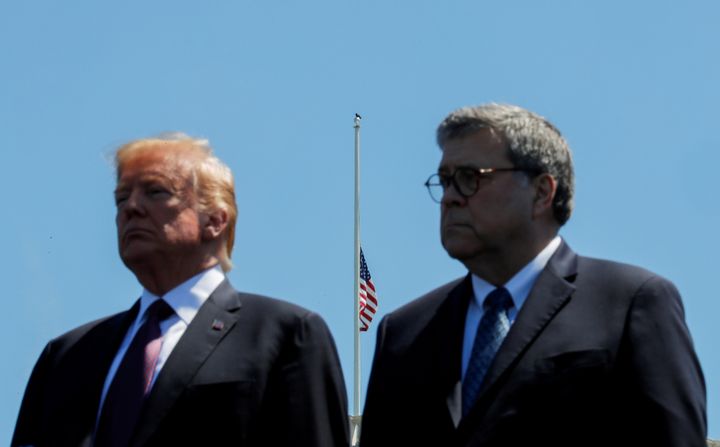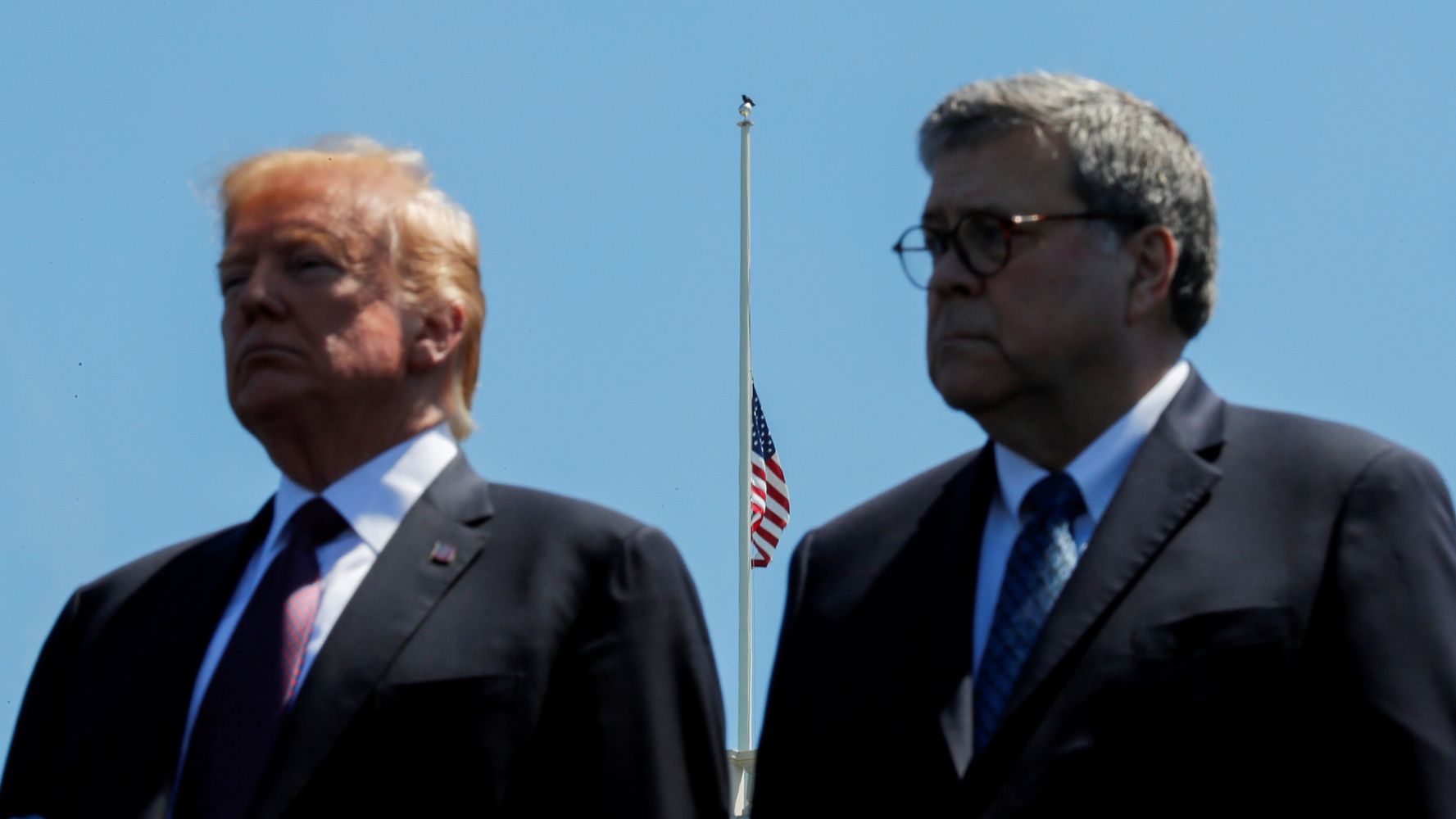[ad_1]
As protests rage across the country over the death of George Floyd at the hands of police in Minneapolis, the Justice Department is once again brushing aside its mandate to bring broader reform to troubled police departments that have lost ― or never had ― their community’s trust.
Since President Donald Trump took office, his appointees at the Justice Department have all but eliminated the federal government’s police reform work. The Civil Rights Division’s police practices group has shrunk by half, and it hasn’t opened any major pattern-or-practice investigations that could rein in police departments that regularly violate constitutional rights.
The Trump administration effectively killed a collaborative reform initiative created by DOJ’s Office of Community Oriented Policing Services that allowed cities to voluntarily implement reform, a move that left the local officials who had partnered with DOJ feeling abandoned.
Under Attorney General William Barr and former Attorney General Jeff Sessions before him, the Trump Justice Department has subscribed to a “bad apples” view of policing that dismisses systemic problems in local police departments that make unconstitutional policing routine. Sessions rolled back police reform even though he conceded he hadn’t actually read any of the DOJ police department investigations he described as “anecdotal.” Barr recently said that communities that don’t show more respect for law enforcement “might find themselves without the police protection they need.”

Federal authorities, like a lot of law enforcement leaders across the country, have expressed shock at the disturbing video of former Minneapolis police Officer Derek Chauvin pressing his knee into Floyd’s neck until he died. But they have stopped short of stating that Chauvin’s conduct reveals anything more broadly about the culture within the Minneapolis Police Department.
“This Justice Department has walked away from police reform,” said Vanita Gupta, who headed the Civil Rights Division under President Barack Obama. Their rhetoric and inaction “created an us-versus-them mentality between law enforcement and the communities they serve,” said Gupta, citing speeches by Barr and Trump, who endorsed police brutality in a 2017 speech to law enforcement. “They’ve actually added fuel to the fire.”
The focus on “bad apples” and charging only individual officers Gupta said, “completely misses the point” and “will not be enough to address the systemic problems and the culture in the department.”
“This is deep,” Gupta told HuffPost. “One single criminal prosecution ― while really important for accountability ― is not going to be sufficient to address the long-standing, deep, systemic issues that clearly exist.”
Christy Lopez, who led the Justice Department’s police reform efforts in Ferguson, said incidents like Floyd’s death leave her pondering the “impossible” question of whether a different Justice Department would have made a difference.
“When something like this happens, I always wonder if maybe it wouldn’t have happened if we had an active Civil Rights Division,” Lopez told HuffPost. “You always just wonder, how would that influence how individual officers act? How stringent would police chiefs be in making sure the rules were followed?”
Lopez said that other police killings in Minneapolis raise questions about how the police are investigating complaints and overseeing use-of-force incidents. She was also disturbed by the behavior of the other four officers on the scene who failed to step up as their colleague ― agonizing minute after agonizing minute ― pressed down on Floyd’s neck.
“It’s not just that they didn’t intervene, it’s that they don’t even appear concerned or surprised by the officer using this tactic,” Lopez said. Had other officers stepped forward to intervene, the outcome could have been totally different, she said.
“He might well not have died,” Lopez said. “But even if he would have, imagine the difference it would have made to see these three other officers trying to help him and to keep the other officer away from him.”
Federal authorities are still deliberating whether to bring criminal federal civil rights charges against Chauvin or any of his colleagues on the scene. Chauvin is already facing third-degree murder and manslaughter charges in Minnesota. But federal prosecutors face a higher bar for prosecution in civil rights cases: Authorities must be able to prove that Chauvin intended to violate Floyd’s constitutional rights.
Gupta, now president of the Leadership Conference on Civil and Human Rights, thinks federal prosecutors can meet that standard here with the help of compelling video evidence.
“It really requires that an officer has specific intent to kill somebody or to violate their constitutional rights,” Gupta told HuffPost. “So the factors that federal prosecutors usually look to in these cases that have a really high bar seem to be present here.”
Barr, however, reportedly sided against attorneys in the Civil Rights Division who wanted to bring charges against the New York Police Department officer who fatally choked Eric Garner. In an appearance at the Justice Department on Saturday, Barr trained his focus on the rioting and destruction in cities across the United States, which he claimed was “planned, organized and driven by anarchistic and far-left extremists, using Antifa-like tactics, many of whom travel from out of state to promote the violence.”
While local and state leaders were primarily responsible for the law enforcement response, Barr said the federal government would enforce laws that make it “a federal crime to cross state lines or to use interstate facilities to incite or participate in violent rioting.” Matthew Krueger, the U.S. Attorney for the Eastern District of Wisconsin, warned Saturday that federal law “imposes stiff penalties for commercial arson and other crimes.”
More broadly, the Trump Civil Rights Division has continued prosecuting egregious incidents of excessive use of force by members of law enforcement. But in many cases, those individual charges raise questions about patterns of conduct in local police departments that the Justice Department never addresses.
DOJ prosecuted a racist police chief in New Jersey, but choose not to evaluate whether the department the bigoted chief headed might have some underlying problems.
Federal prosecutors charged four St. Louis cops in connection with the beating of a Black undercover officer during a protest, but haven’t charged any officers with assaulting any actual protesters even after uncovering text messages depicting officers salivating for an opportunity to unleash violence on demonstrators.
A Justice Department spokesman did not immediately respond to a request for comment, but a spokesperson said in a previous statement to HuffPost that DOJ was “committed to protecting the civil and constitutional rights of all individuals, and understands the important role the department plays in helping communities and police departments as they seek to achieve the same goal while fighting violent crime and protecting public safety.”
Barr, the statement said, “is committed to holding any officer responsible who violates the law without restraining the ability of good police officers trying to do their part in reducing violent crimes.”
Lopez says she thinks the career Civil Rights Division attorneys who have stuck around this long into the Trump administration are hoping to be able to return to their broader police reform work if former Vice President Joe Biden defeats Trump in November.
“If you’ve weathered this much of the storm, at this point you can see what appears to be light at the end of the tunnel,” Lopez said. “If I were still there, I would certainly be waiting it out to see whether a brighter dawn is within reach.”
Calling all HuffPost superfans!
Sign up for membership to become a founding member and help shape HuffPost’s next chapter
[ad_2]
Source link

